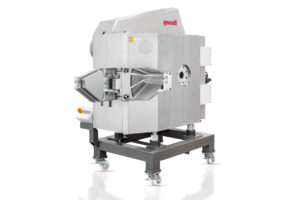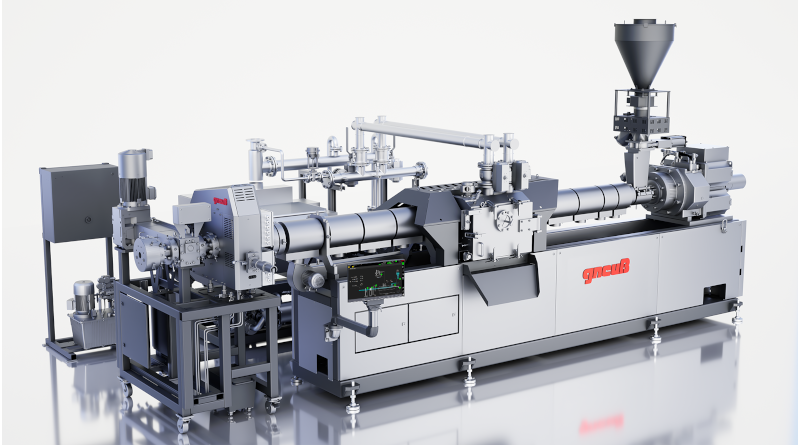Extrusion efficiency
Gneuss Hall 9 – Booth A22
Unlocking new potential in existing processes
In an era of global uncertainty, extrusion processors face mounting pressure to reduce costs while maintaining quality and output. Gneuss offers a new powerful solution in the form of advanced melt filtration and extrusion equipment that can be integrated into existing lines. The company says that with reliable, flexible systems designed for minimal downtime, Gneuss helps processors unlock hidden potential within their current operations.
Filtration technology
The company’s flagship model, the RSFgenius maintains consistent melt pressure even when processing recycled material, thanks to its efficient, automatic, integrated self-cleaning system. This makes it useable for a wide range of applications. The filter elements can be automatically cleaned in situ up to 400 times and filter elements as fine as 10 µm (1,200 mesh) can be applied. The RSFgenius 330 L which will be displayed at the K show is one of the best-selling (and at the same time one of the largest) RSFgenius models. The unit on display has an active filtration area of 2,150 cm² and is for LDPE/ LLDPE film recycling with a filtration fineness of 75 µm. Retrofitting a fully-automatic RSFgenius to an existing extrusion line, whether in a pelletising, sheet, fibre or pipe application, permits the use of more contaminated material and/or the use of finer screens without disrupting the process or reducing production yield. Every retrofit is tailor-made and usually without the need to move any existing equipment.
Three further screen changer ranges will be represented at the K show, the SFXmagnus, SFneos and KSF screen changers. The SFXmagnus is a process-constant screen changer for a wide range of applications, the SFneos is a specialised screen changer which is claimed to offer a high level of process and pressure-stability, equivalent to that offered by the RSFgenius. This way, Gneuss can cover a huge range of applications, where self-cleaning is not necessarily required. This includes fibre extrusion, cast film, blown film with its high pressures, sheet extrusion of all kinds and even PVC recycling. Last but not least, the KSF range of screen changers is process-constant and designed with sensitive polymers in mind, says Gneuss. It is mostly used in compounding where its uniquely customisable design for unbeatably fast material and grade changes is a major advantage. All three ranges of screen changers have in common that they operate pressure and time-controlled, process-constant and that screen changes are made without disturbing the process.
Multiple screw extruder MRS
The MRS extruder is based on conventional single screw technology but is equipped with a multiple screw section for devolatilisation. It is claimed to enable efficient and gentle decontamination of the polymer melt. The MRS extruder permits the processing of rPET directly into high quality end products such as packaging sheet, strapping tape or filaments without pre-drying by using a simple and rugged vacuum system. All this is achieved by its patented processing section. The Multi Rotation Section is a drum containing multiple satellite single screws, driven by a ring gear and pinion transmission.
The satellite screws rotate in the opposite direction to the main screw. This disproportionately increases the surface exchange of the polymer melt. A large opening for venting, exposing the full length of the satellite screws, is under vacuum. This provides unrestricted access to the polymer melt, the surface of which is constantly replaced at a very high rate by the counter-rotation of the satellite screws in the multiple screw section. The surface area – and the surface area exchange rate – available for devolatilisation are far greater than in other extrusion systems. As the thermal and mechanical stress on the polymer melt is minimised, reclaim processed on the MRS extruder has good optical and mechanical properties. In a single, simple extrusion step, harmful contaminants are thoroughly removed, assuring that the end product is safe for use in food contact applications.
OMNI recycling machines
Gneuss’ MRS extrusion technology is known as an alternative for the reprocessing of contaminated materials like polyester (PET), polystyrene (PS), polypropylene (PP) or polyethylene (PE). In combination with efficient rotary filtration systems, optimised vacuum technology, an online viscometer VIS and Gneuss Measurement Technology, customisable recycling lines tailor-made for a specific material can be engineered. As an option, light-weight or fluffy materials can be fed into the extruder via a 3C Rotary Feeder. OMNI recycling lines offer Several Letters of Non-Objection (LNOs) from a North American food safety authority, EFSA conformity and local approvals in Latin America confirm the decontamination efficiency of the technology. As volatile contamination is removed efficiently in the MRS extruder under vacuum and solid contamination is removed by fine filtration in the rotary filtration system, OMNI recycling lines offer food compliant recycling in one simple, compact and sustainable extrusion step.
Typical applications for OMNI recycling machines include the processing of PET reclaim, such as bottle, sheet regrind or fibre waste, into high quality end products, such as thermoformed sheet (suitable for food contact), staple fibre, POY, FDY, BCF or strapping tapes. In addition, a wide range of input materials such as PS, PP, PE, or PLA can be recycled. The OMNI series can also be used in the decontamination of post-consumer waste to produce direct food contact products such as HDPE bottle caps or milk bottles, coffee caps and for odour reduction and degassing of PA, SAN or other polymers.

OMNI 110 recycling machine for post-consumer PET reclaim
At the K show, Gneuss will present the core of an OMNI Recycling Machine – a Multi Rotation System MRS 110 extruder. After the show, the complete line – including, among other components, a water ring vacuum system and the fully automatic RSFgenius 90 melt filtration system – will be delivered to Cotnyl, a leading Argentinian manufacturer specialising in thermoformed plastic packaging. Designed to process 600 kg/h of undried and uncrystallised PET or 400 kg/h of PP, the system will produce high-quality thermoforming sheet for food packaging applications. The technology has already been approved for food contact by Argentina’s food safety authority Senasa.
In addition to its compact design, which requires little space and can therefore be easily integrated into existing premises, the OMNI is claimed to be very flexible. The fully automated control of vacuum, extruder, dosing, degassing dwell time and filter exchange ensures a consistently high quality of the end product while allowing the use of lower cost input materials, says Gneuss. With the tight and varying materials market, it is becoming increasingly important to have maximum flexibility in regard to the input material, especially in the case of varying and uncertain input qualities in the future. Compact design also results in low energy consumption, reducing the CO2 footprint of the recycling process.
Reliable sensor solutions
Gneuss offers robust and adaptable sensor technology for pressure and temperature measurement in extrusion processes. Designed to meet harsh industrial demands, the company’s sensors withstand abrasion, corrosion, and extreme temperatures. Thanks to flexible in-house production, Gneuss delivers both standard and custom-made sensors with short lead times.
Safety and quality in focus
The increasing demands placed on safety and quality make the continuous monitoring of measuring equipment essential. This is particularly true of pressure sensors with a safety function. The reliable CCS 1000 pressure sensor testing device is now available with a heated sensor holder, enabling testing under real operating conditions.
Thanks to its modular design, the CCS1000 can also be retrofitted with a temperature-controlled pressure port. Additionally, the newly developed clamping device for the sensor holder reduces wear on the sealing surfaces, preventing leaks during testing. Gneuss can provide a customised solution for testing needs based on the CCS1000. Pressure ports are available for various thread types, including ½” and M18. Display units can be integrated for the sensor types for use on request. The sensors are future-proof thanks to digital IO-Link communication and optional identification using RFID chips.

